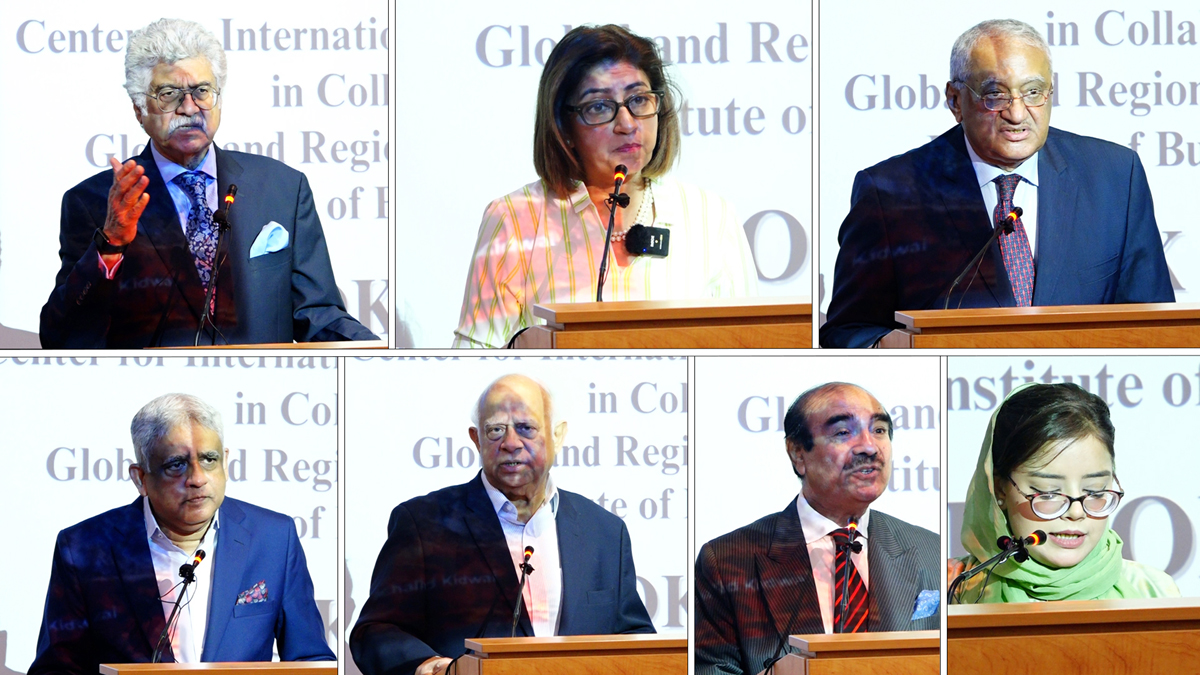By Ambassador (R) Zameer Akram
By Interaction Team
The Center for International Strategic Studies Sindh (CISSS), in collaboration with the Global and Regional Studies Center of the Institute of Business Management (IoBM), hosted the book launch ceremony of “THE SECURITY IMPERATIVE: PAKISTAN’S NUCLEAR DETERRENCE AND DIPLOMACY,” authored by former Ambassador Zameer Akram on November 15, 2023.
Ambassador (R) Zameer Akram elucidated the motives behind his book, emphasizing the necessity of portraying Pakistan’s stance on its nuclear program to the global audience. He countered Western propaganda, highlighted the challenges Pakistan faced, and asserted that the nuclear program was essential for both civilian and defense purposes. Critiquing the double standards of the United States, which supported India’s nuclear program while imposing sanctions on Pakistan, Amb. Akram traced the program’s origins to the threats faced by Pakistan since its inception and defended its legitimacy.
Dr. Huma Baqai praised Amb. Akram’s unbiased analysis, lauding him as a diplomatic “Mujahid.” She acknowledged the book’s revelations, stating that attempts were made to block its publication due to its critical content. Dr. Baqai highlighted Amb. Akram’s meticulous research, presenting a clear narrative of Pakistan’s nuclear program and dispelling doubts through historical references.
Ambassador (R) Qazi Khalilullah, Executive Director of CISSS, commended Zameer Akram’s boldness in addressing all aspects of Pakistan’s nuclear program. He outlined the continuous criticism from the U.S., urging Pakistan to abandon or modify its program, and stressed that despite objections and sanctions, Pakistan remained steadfast due to security concerns posed by India and external interventions.
Defense Analyst Ikram Sehgal emphasized the long-overdue need for awareness and understanding of Pakistan’s nuclear program. Sehgal praised Amb. Akram’s courage in presenting the truth, shedding light on the program’s challenges and successes. He underscored the importance of aligning Pakistan’s security and foreign policies with the current geopolitical landscape.
Mr. Talib S. Karim, President IoBM, highlighted the book’s significance as a guiding light for the younger generation. He stressed the need for education and scientific knowledge, expressing concern over the educational gap in Pakistan. Mr. Karim credited Pakistan’s perseverance in the face of negative propaganda and diplomatic challenges to achieving its nuclear goals.
Ambassador (R) GR Baloch thanked attendees and congratulated Zameer Akram for providing a valuable resource on a crucial subject. He praised the collaboration between CISSS and IOBM and hinted at future seminars, emphasizing the importance of Akram’s book in this collaborative effort.
Research Officer at CISSS, Safia Malik, highlighted the book’s excellence while presenting the book’s review. She praised Akram’s insightful grasp of the subject and recommended the book as essential reading for those interested in understanding Pakistan’s security policies and countering negative propaganda.
Numerous scholars and researchers hailing from CISSS, Rabita Forum International (RFI), IOBM University, and various other organizations and universities actively took part in the seminar, contributing to a rich dialogue and enhanced comprehension of Pakistan’s nuclear trajectory.
The valuable presence of former Ambassadors Alam Brohi and Hassan Habib, along with Dr. Shahida Wizarat, enriched the proceedings. The seminar concluded with the signing of an MOU, paving the way for future collaborations between CISSS and IOBM, with a shared objective of promoting sustained engagement in well-informed discussions on crucial issues.


